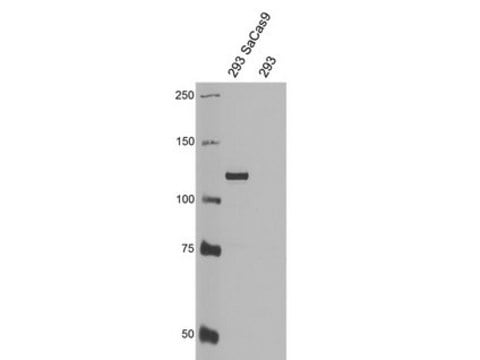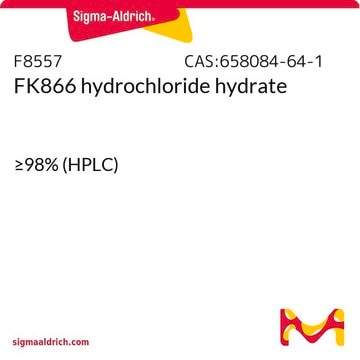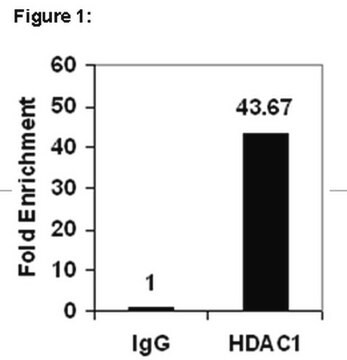AB356480
Anti-Cas9 (Rabbit Polyclonal)
serum, from rabbit
Synonyme(s) :
SaCas9, CRISPR-associated endonuclease Cas9
About This Item
Produits recommandés
Source biologique
rabbit
Niveau de qualité
Forme d'anticorps
serum
Type de produit anticorps
primary antibodies
Clone
polyclonal
Espèces réactives
Staphylococcus aureus, bacteria
Conditionnement
antibody small pack of 25 μL
Technique(s)
immunofluorescence: suitable
western blot: suitable
Isotype
IgG
Numéro d'accès UniProt
Conditions d'expédition
ambient
Modification post-traductionnelle de la cible
unmodified
Description générale
Spécificité
Application
Western Blotting Analysis: A 1:1,000 dilution from a representative lot detected Cas9 in HEK293 cells overexpressing fusion protein GFP-Cas9 (Courtesy of Dr. Gerry Shaw).
Qualité
Western Blotting Analysis: 0.2 µg/mL of this antibody detected Cas9 (Rabbit Polyclonal) in 40 µg of HEK293 cells overexpressing fusion protein GFP-Cas9 from Staphylococcus aureus.
Description de la cible
Autres remarques
Vous ne trouvez pas le bon produit ?
Essayez notre Outil de sélection de produits.
Code de la classe de stockage
12 - Non Combustible Liquids
Classe de danger pour l'eau (WGK)
WGK 1
Certificats d'analyse (COA)
Recherchez un Certificats d'analyse (COA) en saisissant le numéro de lot du produit. Les numéros de lot figurent sur l'étiquette du produit après les mots "Lot" ou "Batch".
Déjà en possession de ce produit ?
Retrouvez la documentation relative aux produits que vous avez récemment achetés dans la Bibliothèque de documents.
Notre équipe de scientifiques dispose d'une expérience dans tous les secteurs de la recherche, notamment en sciences de la vie, science des matériaux, synthèse chimique, chromatographie, analyse et dans de nombreux autres domaines..
Contacter notre Service technique



![[1,1′-bis(diphénylphosphino)ferrocène]dichloropalladium(II)](/deepweb/assets/sigmaaldrich/product/structures/130/734/8846aa26-1858-458a-998d-8c306c13bf0f/640/8846aa26-1858-458a-998d-8c306c13bf0f.png)




